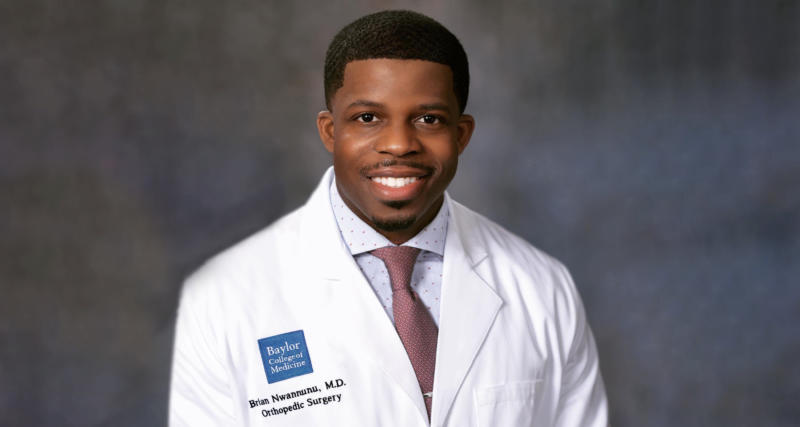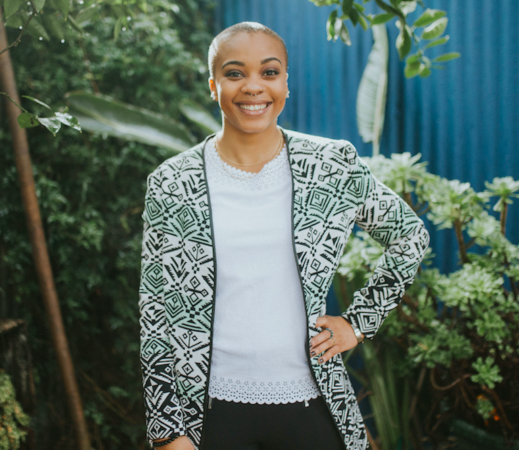Dr. Brian Nwannunu, an adult-reconstruction fellow in orthopedics at Baylor College of Medicine, specializes more than just in the musculoskeletal system; he’s working to diversify the orthopedic surgery industry.
The American Academy of Orthopaedic Surgeons reported that as of 2018, 84.7 percent of orthopedic surgeons identify as white, 6.7 percent identify as Asian, and 2.2 percent identify as Hispanic or Latino. This lack of diversity intensifies since only 1.9 percent of orthopedic surgeons identify as Black, and less than one percent are Native American.
There isn’t just a lack of diversity in the orthopedic industry; there’s a lack of acceptance that Black people can work in this medical field.
“A few of my rotations, the general culture, and the underlying message was, ‘We don’t want anyone that doesn’t look like us,'” Nwannunu, who is a first-generation Nigerian American, told the Houston Chronicle in an interview. “They don’t feel like they can relate to you. They would shun me. Active teaching residents wouldn’t look at me and only talk to other students. I knew I wasn’t wanted.”
Nwannunu told the Houston Chronicle that he’s wanted to be an orthopedic surgeon since his experience dealing with an ankle injury from playing basketball in high school. Hailing from Dallas, Nwannunu holds many academic accolades. According to his Linkedin profile, Nwannunu acquired a bachelor’s degree in biology from Morehouse College, a master’s degree in physiology from Georgetown University, and a doctor of medicine degree from Howard University College of Medicine.
The board-certified orthopedic surgeon completed his residency at John Peter Smith Hospital before continuing his education through a fellowship program at Baylor in Houston. During his residency experiences, Nwannunu told the Houston Chronicle that many of his superiors, who were white orthopedic surgeons, would claim to want to see more diversity and inclusion in the industry. Still, it proved to be all talk in the end.
“When you talk to them, it was evident they didn’t want someone here who was different,” Nwannunu told the outlet.
The pandemic has put a brighter spotlight on America’s health disparities, especially those from minority communities. Dr. Melvyn Harrington, a professor of orthopedic surgery and adult-reconstruction director at Baylor, said a solution to this could be getting minority medical students more interested in orthopedics earlier in their careers.
Harrington co-authored a paper in 2019 that shed light on the lack of diversity in the orthopedic surgery field. Harrington said that the field needs a more diverse workforce to serve various patients. Even more prevalent now, patients look for minority representation in doctor’s offices because they feel safer getting care from someone who looks like them.
Harrington claims that the orthopedics field is the least diverse in the medical industry in terms of race, ethnicity, and gender, and there is plenty of research that backs this up. Nearly 93 percent of orthopedic surgeons are men, the American Academy of Orthopaedic Surgeons reported, and roughly only six percent identify as women.
The average age of orthopedic surgeons is 56.5-years-old, which calls to Harrington’s suggestion that the field needs to attract and retain medical students sooner. Programs like Nth Dimensions are trying to change these disparities by helping underrepresented medical school students venture on a pathway into orthopedic residencies.
“There’s been some inherent bias against underrepresented students and women in programs over the years,” Harrington told the Houston Chronicle. “Programs will not hire a woman because they might get pregnant and need to take time off. It’s been a very stereotypical old boys club, locker-room culture.”
Overall, 56.2 percent of doctors in the US are white, the Association of American Medical Colleges reported in 2018, and Black physicians only account for five percent of doctors in America. Other medical industries are experiencing the same lack of diversity. In 2020, the American Society for Plastic Surgeons reported that “it would take more than 8,013 and 863 years for Black and Latinx Americans, respectively, to attain parity in plastic surgery.”
Nwannunu, who worked with Nth Dimensions, plans to move back to Dallas, TX after his fellowship to join a private practice that celebrates and promotes diversity. He’s eager to inspire more physicians that look like him to work in the orthopedics field.
“Multiple people come up to me and say I’m the first Black doctor they’ve ever seen,” Nwannunu told the Houston Chronicle. “They said they don’t trust the older, white guy, but they trust me to do their surgery. That’s the type of difference that can be made when the career of orthopedics is diverse.”


